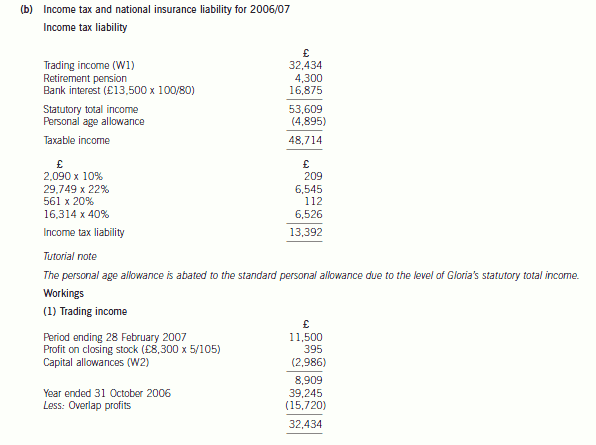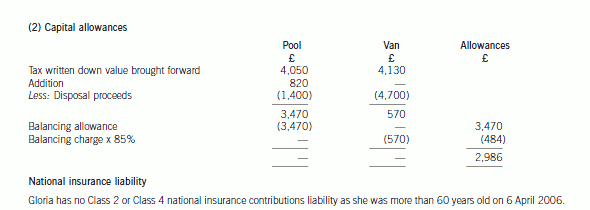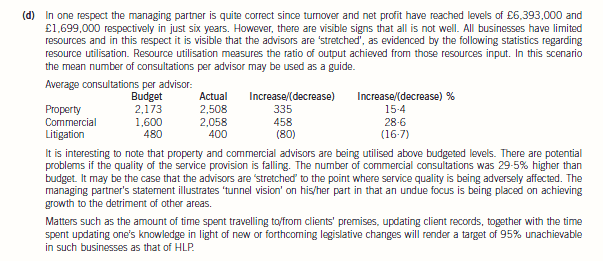2019年江西ACCA报名条件
发布时间:2019-01-06
2019年江西ACCA报名条件:
a.具有教育部认可的大专以上学历,既可以报名成为ACCA的正式学员。
b.教育部认可的高等院校在校生,且顺利通过第一学年的所有课程考试,既可报名成为ACCA正式学员。
c.未符合以上报名资格的申请者,而年龄在21岁以上,可以遵循成年考生(MSER)途径申请入会。该途径允许学生作为ACCA校外进修生学习,只须在前两年的四次考试中通过1.1和1.2两门课程,便能以正式学员身份继续参加其它课程考试。
下面小编为大家准备了 ACCA考试 的相关考题,供大家学习参考。
(b) Compute Gloria’s total income tax and national insurance liability for 2006/07. (7 marks)


(b) While the refrigeration units were undergoing modernisation Lamont outsourced all its cold storage requirements
to Hogg Warehousing Services. At 31 March 2007 it was not possible to physically inspect Lamont’s inventory
held by Hogg due to health and safety requirements preventing unauthorised access to cold storage areas.
Lamont’s management has provided written representation that inventory held at 31 March 2007 was
$10·1 million (2006 – $6·7 million). This amount has been agreed to a costing of Hogg’s monthly return of
quantities held at 31 March 2007. (7 marks)
Required:
For each of the above issues:
(i) comment on the matters that you should consider; and
(ii) state the audit evidence that you should expect to find,
in undertaking your review of the audit working papers and financial statements of Lamont Co for the year ended
31 March 2007.
NOTE: The mark allocation is shown against each of the three issues.
(b) Outsourced cold storage
(i) Matters
■ Inventory at 31 March 2007 represents 21% of total assets (10·1/48·0) and is therefore a very material item in the
balance sheet.
■ The value of inventory has increased by 50% though revenue has increased by only 7·5%. Inventory may be
overvalued if no allowance has been made for slow-moving/perished items in accordance with IAS 2 Inventories.
■ Inventory turnover has fallen to 6·6 times per annum (2006 – 9·3 times). This may indicate a build up of
unsaleable items.
Tutorial note: In the absence of cost of sales information, this is calculated on revenue. It may also be expressed
as the number of days sales in inventory, having increased from 39 to 55 days.
■ Inability to inspect inventory may amount to a limitation in scope if the auditor cannot obtain sufficient audit
evidence regarding quantity and its condition. This would result in an ‘except for’ opinion.
■ Although Hogg’s monthly return provides third party documentary evidence concerning the quantity of inventory it
does not provide sufficient evidence with regard to its valuation. Inventory will need to be written down if, for
example, it was contaminated by the leakage (before being moved to Hogg’s cold storage) or defrosted during
transfer.
■ Lamont’s written representation does not provide sufficient evidence regarding the valuation of inventory as
presumably Lamont’s management did not have access to physically inspect it either. If this is the case this may
call into question the value of any other representations made by management.
■ Whether, since the balance sheet date, inventory has been moved back from Hogg’s cold storage to Lamont’s
refrigeration units. If so, a physical inspection and roll-back of the most significant fish lines should have been
undertaken.
Tutorial note: Credit will be awarded for other relevant accounting issues. For example a candidate may question
whether, for example, cold storage costs have been capitalised into the cost of inventory. Or whether inventory moves
on a FIFO basis in deep storage (rather than LIFO).
(ii) Audit evidence
■ A copy of the health and safety regulation preventing the auditor from gaining access to Hogg’s cold storage to
inspect Lamont’s inventory.
■ Analysis of Hogg’s monthly returns and agreement of significant movements to purchase/sales invoices.
■ Analytical procedures such as month-on-month comparison of gross profit percentage and inventory turnover to
identify any trend that may account for the increase in inventory valuation (e.g. if Lamont has purchased
replacement inventory but spoiled items have not been written off).
■ Physical inspection of any inventory in Lamont’s refrigeration units after the balance sheet date to confirm its
condition.
■ An aged-inventory analysis and recalculation of any allowance for slow-moving items.
■ A review of after-date sales invoices for large quantities of fish to confirm that fair value (less costs to sell) exceed
carrying amount.
■ A review of after-date credit notes for any returns of contaminated/perished or otherwise substandard fish.
3 Mary Hobbes joined the board of Rosh and Company, a large retailer, as finance director earlier this year. Whilst she
was glad to have finally been given the chance to become finance director after several years as a financial
accountant, she also quickly realised that the new appointment would offer her a lot of challenges. In the first board
meeting, she realised that not only was she the only woman but she was also the youngest by many years.
Rosh was established almost 100 years ago. Members of the Rosh family have occupied senior board positions since
the outset and even after the company’s flotation 20 years ago a member of the Rosh family has either been executive
chairman or chief executive. The current longstanding chairman, Timothy Rosh, has already prepared his slightly
younger brother, Geoffrey (also a longstanding member of the board) to succeed him in two years’ time when he plans
to retire. The Rosh family, who still own 40% of the shares, consider it their right to occupy the most senior positions
in the company so have never been very active in external recruitment. They only appointed Mary because they felt
they needed a qualified accountant on the board to deal with changes in international financial reporting standards.
Several former executive members have been recruited as non-executives immediately after they retired from full-time
service. A recent death, however, has reduced the number of non-executive directors to two. These sit alongside an
executive board of seven that, apart from Mary, have all been in post for over ten years.
Mary noted that board meetings very rarely contain any significant discussion of strategy and never involve any debate
or disagreement. When she asked why this was, she was told that the directors had all known each other for so long
that they knew how each other thought. All of the other directors came from similar backgrounds, she was told, and
had worked for the company for so long that they all knew what was ‘best’ for the company in any given situation.
Mary observed that notes on strategy were not presented at board meetings and she asked Timothy Rosh whether the
existing board was fully equipped to formulate strategy in the changing world of retailing. She did not receive a reply.
Required:
(a) Explain ‘agency’ in the context of corporate governance and criticise the governance arrangements of Rosh
and Company. (12 marks)
(a) Defining and explaining agency
Agency is defined in relation to a principal. A principal appoints an agent to act on his or her behalf. In the case of corporate
governance, the principal is a shareholder in a joint stock company and the agents (that have an agency relationship with
principals) are the directors. The directors remain accountable to the principals for the stewardship of their investment in the
company. In the case of Rosh, 60% of the shares are owned by shareholders external to the Rosh family and the board has
agency responsibility to those shareholders.
Criticisms of Rosh’s CG arrangements
The corporate governance arrangements at Rosh and Company are far from ideal. Five points can be made based on the
evidence in the case.
There are several issues associated with the non-executive directors (NEDs) at Rosh. It is doubtful whether two NEDs are
enough to bring sufficient scrutiny to the executive board. Some corporate governance codes require half of the board of larger
companies to be non-executive and Rosh would clearly be in breach of such a requirement. Perhaps of equal concern, there
is significant doubt over the independence of the current NEDs as they were recruited from retired executive members of the
board and presumably have relationships with existing executives going back many years. Some corporate governance codes
(such as the UK Combined Code) specify that NEDs should not have worked for the company within the last five years. Again,
Rosh would be in breach of this provision.
Succession planning for senior positions in the company seems to be based on Rosh family membership rather than any
meritocratic approach to appointments (there doesn’t appear to be a nominations committee). Whilst this may have been
acceptable before the flotation when the Rosh family owned all of the shares, the flotation introduced an important need for
external scrutiny of this arrangement. The lack of NED independence makes this difficult.
There is a poor (very narrow) diversity of backgrounds among board members. Whilst diversity can bring increased conflict,
it is generally assumed that it can also stimulate discussion and debate that is often helpful.
There is a somewhat entrenched executive board and Mary is the first new appointment to the board in many years (and is
the first woman). Whilst experience is very important on a board, the appointment of new members, in addition to seeding
the board with talent for the future, can also bring fresh ideas and helpful scrutiny of existing policies.
There is no discussion of strategy and there is evidence of a lack of preparation of strategic notes to the board. The assumption
seems to be that the ‘best’ option is obvious and so there is no need for discussion and debate. Procedures for preparing
briefing notes on strategy for board meetings appear to be absent. Most corporate governance codes place the discussion and
setting of strategy as a high priority for boards and Rosh would be in breach of such a provision.
There is no evidence of training for Mary to facilitate her introduction into the organisation and its systems. Thorough training
of new members and ongoing professional development of existing members is an important component of good governance.
(d) The managing partner of HLP stated at a recent partners’ meeting that ‘every advisor should aim to ensure that
95% of all hours he/she works are billed to clients. This will ensure that we remain both profitable and
competitive’.
Required:
Discuss the statement of the managing partner, drawing attention to any concerns that you may have
regarding the statement. (6 marks)

声明:本文内容由互联网用户自发贡献自行上传,本网站不拥有所有权,未作人工编辑处理,也不承担相关法律责任。如果您发现有涉嫌版权的内容,欢迎发送邮件至:contact@51tk.com 进行举报,并提供相关证据,工作人员会在5个工作日内联系你,一经查实,本站将立刻删除涉嫌侵权内容。
- 2020-01-10
- 2020-01-10
- 2020-01-09
- 2020-02-23
- 2020-02-22
- 2020-02-26
- 2019-01-06
- 2020-01-09
- 2020-01-09
- 2020-01-09
- 2020-02-23
- 2020-01-09
- 2020-01-09
- 2020-02-22
- 2020-01-03
- 2020-09-05
- 2020-02-26
- 2019-01-17
- 2020-04-23
- 2020-01-09
- 2020-02-13
- 2020-02-22
- 2020-01-10
- 2020-02-28
- 2020-01-10
- 2020-01-03
- 2019-01-17
- 2020-02-26
- 2020-01-10
- 2020-02-23